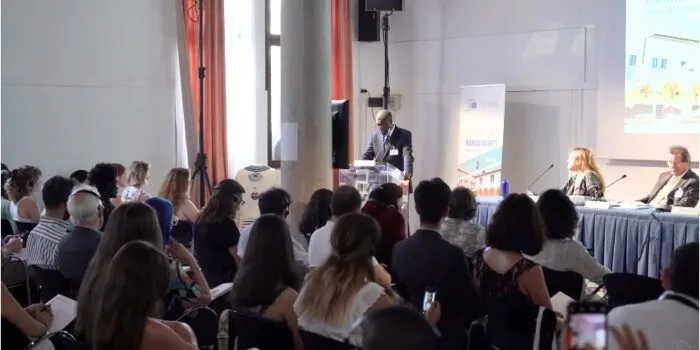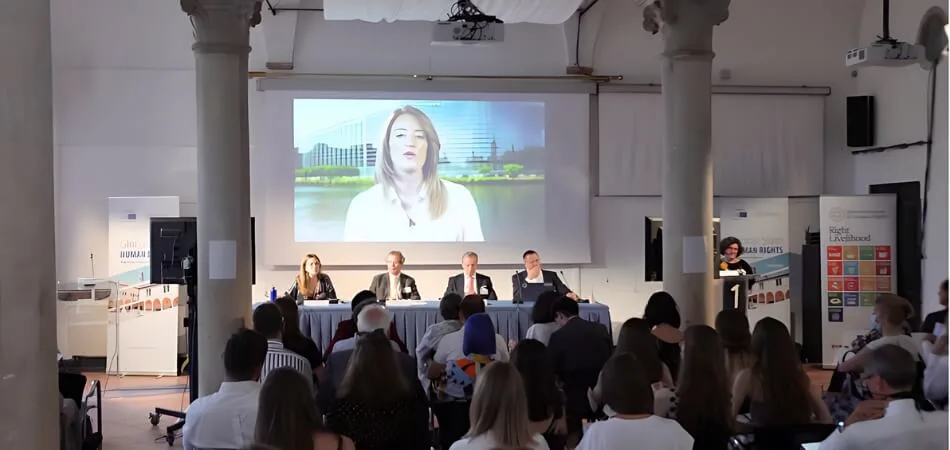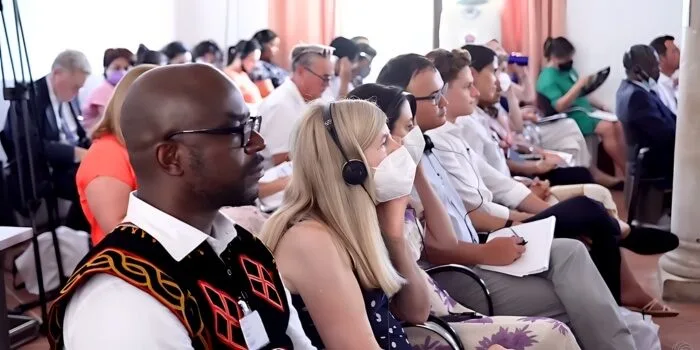Attending a Human Rights and Refugees Conference in Canada from Ghana offers a unique chance to engage with global issues and network with professionals. However, managing the process requires preparation. From securing the right visa to travel arrangements, each step is crucial for a smooth and successful trip.
First, you’ll need to apply for a Canadian visa. Gather essential documents, including a letter of invitation, proof of finances, and a valid passport. Applying for a Temporary Resident Visa (TRV) is the recommended path for this trip.
Once your visa is secured, arrange flights and accommodations. It’s also essential to familiarize yourself with Canada’s customs and regulations. Continue reading to discover all the key details on how to attend a Human Rights and Refugees Conference in Canada from Ghana.
What is the Purpose of Human Rights and Refugees Conferences in Canada?
Human Rights and Refugees Conferences in Canada serve as crucial platforms for addressing global humanitarian issues, initiating dialogue, and encouraging collaboration among advocates, experts, and policymakers. These events aim to drive positive change and raise awareness of the challenges refugees and marginalized communities face worldwide. Below are the key purposes of these conferences:
Raising Awareness
Conferences highlight pressing human rights issues, particularly those affecting refugees. Attendees gain insights into the causes, impacts, and solutions to various human rights violations, which amplifies global attention on these topics.
Promoting Policy Advocacy
By gathering experts, policymakers, and activists, these conferences provide a space to discuss and influence refugee policies. Advocates can propose actionable solutions, shaping future policies that support refugee rights and protection.
Strengthening International Cooperation
Conferences promote cooperation among countries and organizations by promoting collaboration between international bodies, governments, NGOs, and humanitarian agencies. The upcoming Human Rights and Refugees Conference is another opportunity to strengthen the global network of support for refugees and human rights issues.
Providing a Platform for Refugee Voices
Refugees and displaced individuals often participate in these events, sharing their experiences and challenges. This personal insight offers a critical perspective, ensuring that discussions remain grounded in the realities refugees face.
Capacity Building and Education
Human rights and refugees conferences often feature workshops, training sessions, and educational programs. Attendees can develop skills and gain knowledge that help them become better advocates and professionals in humanitarian fields.
Encouraging Networking and Collaboration
Conferences offer opportunities to network with other professionals, organizations, and influencers in the human rights and refugee sectors. These connections can lead to future collaborations, research, or policy initiatives aimed at supporting refugees and advancing human rights globally.
Attending these conferences can help bring about global change. By participating, you contribute to shaping a better, more inclusive future for refugees and marginalized communities.
How to Attend a Human Rights and Refugees Conference in Canada from Ghana?
Connect with like-minded individuals from Ghana at a Human Rights and Refugees Conference in Canada. If you’re wondering how to attend a human rights and refugees conference in Canada from Ghana, here’s a guide to help you get through the process.
Step 1: Research and Select a Conference
The first step in attending a conference is researching events that align with your passion for human rights and refugee issues. Look for conferences that offer not only insightful discussions but also opportunities to connect with professionals in the field.
Consider the topics, keynote speakers, and workshops that match your interests. Once you’ve found a suitable conference, check the dates, location, and registration details. This ensures you’re well-prepared and can plan your travel, accommodation, and participation effectively.
Step 2: Register for the Conference
Once you’ve chosen a conference, the next step is to register. Typically, this involves filling out an online registration form with details like your name, contact information, and professional background. Make sure all the information you provide is accurate to avoid any issues later.
You may also need to pay a registration fee, so be prepared for that. Follow the instructions carefully, as some conferences might have specific requirements or deadlines to secure your spot.
Step 3: Apply for a Canadian Visa
As a Ghanaian citizen, attending a conference in Canada requires you to apply for a visa. You’ll need to gather essential documents, including a valid passport, a formal invitation letter from the conference organizers, and proof of accommodation. These documents are crucial to supporting your visa application.
Visit the Canadian Embassy’s website to understand the specific visa requirements and begin the application process. Make sure all your paperwork is in order to avoid delays and ensure a smooth visa approval.
Step 4: Book Your Travel and Accommodation
Once your visa is approved, it’s time to book your flights to Canada. Securing your travel arrangements early can help you find better deals and avoid last-minute stress. Be sure to choose flights that align with the conference schedule, ensuring you arrive with enough time to settle in.
When booking accommodation, opt for a place near the conference venue. Hotels and rentals close to the event may fill up fast, so early booking is key. Choose a spot that also allows you to explore the city during your free time.
 Step 5: Prepare for the Conference
Step 5: Prepare for the Conference
Before heading to the conference, take time to review the agenda and highlight sessions or workshops that align with your interests. While attending Human Rights and Refugees Conference sessions, you’ll want to focus on those that resonate most with you to maximize your experience.
If you’re presenting or participating in a panel, ensure your materials are polished, well-prepared, and rehearsed to avoid last-minute stress. Additionally, pack wisely, keeping the Canadian climate in mind. Layering is key. Also, ensure your attire meets the conference’s dress code, whether formal or business casual.
Step 6: Travel to Canada
Before traveling to Canada, double-check that you have all essential documents. These include your passport, visa, conference registration confirmation, and travel insurance. Having everything in order ensures a smooth entry into Canada and avoids unnecessary delays at immigration.
Arriving a few days before the conference allows you to settle in, adjust to the local time zone, and explore the area. This extra time helps you feel more comfortable, making the experience more enjoyable and productive.
Step 7: Attend the Conference
Attending the conference is more than just listening—it’s about actively engaging in the experience. Take full advantage of networking sessions, panel discussions, and workshops. By participating, asking questions, and sharing ideas, you contribute to meaningful conversations while expanding your knowledge.
Engage with fellow attendees to build lasting connections. These events are ideal for meeting like-minded individuals and experts who share your passion for human rights and refugees. Remember, the more involved you are, the more you’ll benefit from the experience.
Step 8: Follow Up
After the conference, it’s essential to follow up with the connections you made. Reach out to them on platforms like LinkedIn, where you can maintain professional relationships and stay updated on their work. This simple step helps solidify your network and keeps you engaged with like-minded professionals.
Consider also staying in touch with organizers and speakers who inspired you. A thoughtful message or email expressing appreciation for their insights can open doors to future collaborations and keep you involved in the human rights community.
These steps will help you attend a Human Rights and Refugees Conference in Canada from Ghana, enriching your knowledge and contributing to significant global discussions.
Types of Human Rights and Refugees Conferences In Canada
Human Rights and Refugees Conferences in Canada offer diverse platforms for discussions on critical global issues. These events are organized for various audiences, from policymakers to grassroots advocates, ensuring that everyone involved in the protection of human rights has a voice. Below are some common types of these conferences.
Academic Conferences
These conferences bring together scholars, researchers, and students to discuss the latest research and developments in human rights and refugee studies. If you’re eager to dive into the academic side of these issues, join Human Rights and Refugees Conference events that focus on sharing new ideas, theories, and solutions.
Policy and Advocacy Conferences
These events focus on the practical aspects of human rights protection. Experts, policymakers, and advocates come together to discuss policies that affect refugees and marginalized communities. The goal is to influence change by proposing solutions that can be adopted at local, national, and international levels.
Grassroots and Community-Based Conferences
These conferences often target local communities and smaller organizations working directly with refugees. They focus on practical, on-the-ground challenges, offering workshops, networking opportunities, and resources for individuals and groups that provide direct support to refugees.
International Humanitarian Conferences
These large-scale events attract global organizations, governments, and NGOs, addressing issues like refugee resettlement, global migration, and humanitarian aid. They aim to foster international cooperation and promote comprehensive solutions to human rights crises.
Each type of conference offers valuable insights and opportunities, catering to different areas of human rights and refugee advocacy.
Can You Attend a Human Rights and Refugees Conference In Canada from Ghana?
Yes, you can attend a Human Rights and Refugees Conference in Canada from Ghana. With proper planning and meeting the requirements, it’s possible to participate in these impactful events. However, several factors need to be considered to ensure a smooth and successful journey. Here are the key points to keep in mind.
Visa Requirements
You will need a Canadian visa to attend the conference. This typically involves applying for a Temporary Resident Visa (TRV). Ensure you gather all necessary documents such as your passport, invitation letter from the conference, and proof of financial stability.
Financial Planning
Attending a conference in another country can be costly. You’ll need to budget for visa fees, flights, accommodation, meals, and other travel-related expenses. Look into scholarships or sponsorships that might be available through the conference organizers or external organizations.
Health and Travel Insurance
Securing travel insurance is essential, as it covers unforeseen medical expenses, flight cancellations, or lost luggage. Make sure to check if your insurance includes health coverage while you’re in Canada.
Conference Registration
Be sure to register for the conference in advance. This might involve early registration fees, which are often cheaper. Keep an eye on deadlines for registration and make sure you have all the necessary confirmations before traveling.
Cultural and Weather Preparation
Canada’s culture and weather might be quite different from Ghana’s. Research the weather conditions during your visit, so you can pack appropriately. Additionally, familiarizing yourself with Canadian customs and etiquette will ensure a more comfortable experience.
By considering these factors, you’ll be well-prepared to attend a Human Rights and Refugees Conference in Canada from Ghana, making the most of this valuable opportunity.
Benefits of Attending a Human Rights and Refugees Conference in Canada from Ghana
Human Rights and Refugees Conferences can transform people from Ghana. Here are some benefits of participating in such an event.
- Networking Opportunities: Connect with experts, activists, and fellow participants who share your passion for human rights and refugee issues. These connections can lead to collaborations, mentorships, and career opportunities.
- Knowledge Enhancement: Learn about the latest research, policies, and practices in the field. Conferences often feature workshops, panel discussions, and keynote speeches that provide valuable insights.
- Global Perspective: Gain a broader understanding of human rights and refugee issues by hearing diverse viewpoints and experiences from around the world.
- Advocacy Skills: Many conferences offer training sessions on advocacy and campaigning techniques. These skills are essential for effecting change in your community or organization.
- Cultural Exchange: Experience Canadian culture and hospitality. Conferences often include social events and cultural activities that allow attendees to explore the host country.
- Personal Growth: Immersing yourself in an environment dedicated to human rights and social justice can be personally fulfilling and inspiring. It can reinforce your commitment to making a positive impact in the world.
Frequently Asked Questions
Being able to attend a human rights conference in Canada from Ghana is exciting. However, it’s critical to be well-prepared and informed about the visa process and other aspects of your trip.
Here are some frequently asked questions to help you plan your journey.
Attending a Human Rights and Refugees Conference in Canada from Ghana is an incredible opportunity to contribute to global discussions and gain valuable insights. However, there are several common questions people often ask before starting on this journey.
Is financial assistance available for attending the conference?
Some conferences offer scholarships or travel grants for participants, particularly for those from developing countries. Check with the conference organizers or research external sponsorship programs that may cover travel, accommodation, or registration fees.
Can I attend the conference virtually if I can’t travel?
Yes, many conferences now offer virtual attendance options. This allows you to participate in key sessions and workshops online, providing flexibility if you’re unable to travel due to visa issues, budget constraints, or personal reasons.
How long does it take to process a Canadian visa for conference attendance?
Visa processing times vary, but it can take several weeks. Apply as early as possible, ideally a few months in advance, to avoid last-minute complications and ensure your documents are ready before the conference date.
Can I work in Canada while attending the conference?
No, a Temporary Resident Visa (TRV) for conference attendance does not allow you to work in Canada. You would need a separate work permit for employment. The TRV only covers your stay for the conference and other personal activities.
Is English proficiency required to attend the conference?
Yes, English proficiency is generally required, as most conferences in Canada are conducted in English. However, if you’re not fluent, some events may offer translation services or support, depending on the organizers’ provisions for international attendees.
What is the best time to apply for the conference visa?
It’s best to apply for your visa as soon as you receive your conference invitation. Visa processing can take several weeks or even months, so applying early gives you ample time to address any issues or delays that might arise.
Conclusion
Attending a Human Rights and Refugees Conference in Canada from Ghana is a meaningful way to engage with global humanitarian efforts and connect with key advocates in the field. While the process may seem complex, it’s achievable with careful preparation and attention to detail.
By following the right steps—securing a visa, organizing your travel, and preparing for the conference—you’ll be well-equipped to make the most of this opportunity. Remember, such events provide valuable platforms for learning, networking, and contributing to impactful discussions.
Now that you know how to attend a Human Rights and Refugees Conference in Canada from Ghana, all that’s left is to take the plunge. Prepare thoroughly, and you’ll be ready to make a difference on a global scale.








